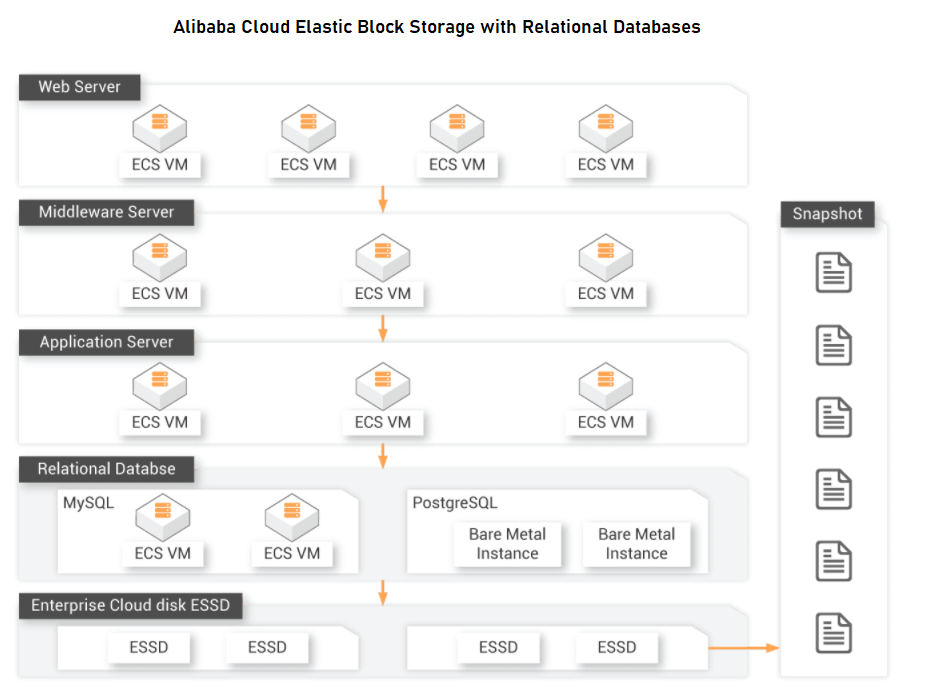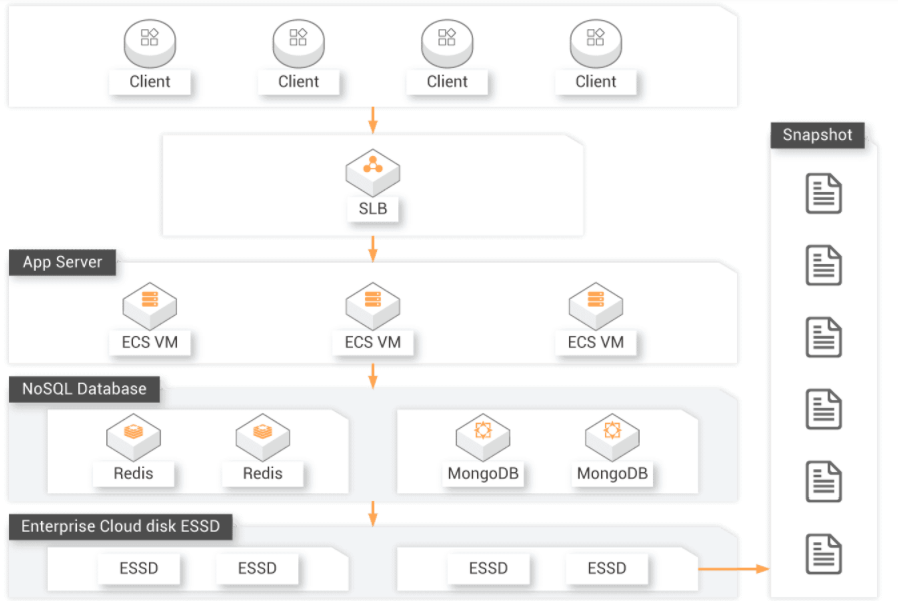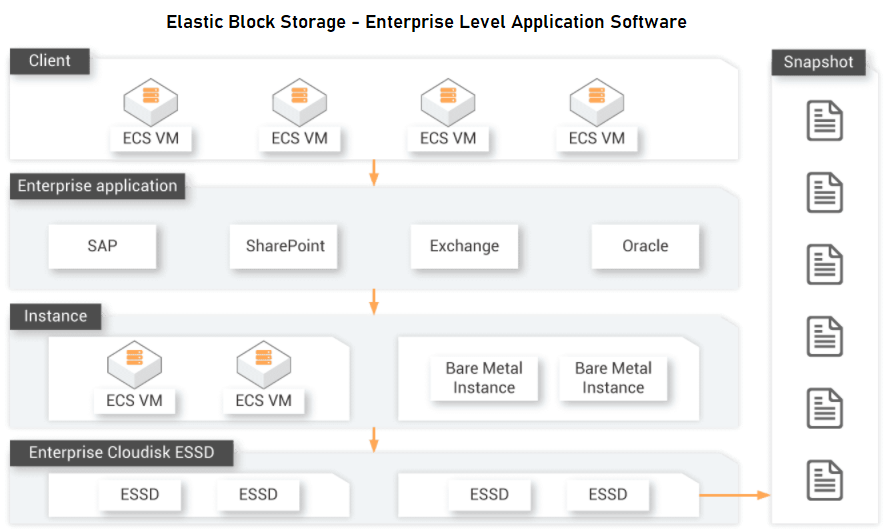By Shantanu Kaushik
In Part 1 of this article series on Cloud Storage Solutions by Alibaba Cloud and how to utilize them by requirements, we discussed how important optimizing your cloud storage solution is. We also laid out some of the key scenarios and explained the deep integration of Alibaba Cloud services associated with these scenarios.
In this article, we will discuss the Block Storage service and the different useful usage scenarios. We will also discuss optimizing these storage solutions to achieve more cost-effectiveness with your storage service. In Part 3 (the final article) of the series, we will talk about data durability and the implementation of security practices by gathering important storage metrics.
Alibaba Cloud Block Storage is a storage solution that is attached with the Elastic Compute Service (ECS) instances. It offers high-performance with random read/write operations that can accelerate up to 1,000,000 Input/Output Operations Per Second (IOPS). Block Storage offers low latency and enables automatic replication for storage volumes within the same region to account for disaster recovery scenarios, including hardware failure.
Block Storage works to achieve better business continuity and to provide stability during crucial workload scenarios. Block Storage allows you to create a file system for devices using block storage to achieve data persistence. It supports data encryption with a centralized Key Management System (KMS) for a no-fuss encryption scenario.
Block Storage enables the automated scaling of disks without the need to restart the ECS instance. When deploying an enterprise-level instance, the block storage offers input and output isolation to separate bandwidth assigned to input and output operations. This accounts for a highly-stable and consistent performance.
Alibaba Cloud Block Storage is based on the latest generation of software and hardware methodologies. The networking architecture and the enhanced SSD drives offer a tremendous performance boost over the previous generation storage solutions. ESSDs are the most suited storage type for relational database systems deployed over Alibaba Cloud ECS instances.
When it comes to handling databases, the Block Storage provides a low-latency random access feature, and the ESSDs ensure that your read/write performance stays maximized throughout the database access cycle. ESSDs are deployed in a distributed storage architecture to enhance the experience when working with databases.

Alibaba Cloud Block Storage provides seamless support for NoSQL Databases. The diagram below shows the compatible architecture:

Block Storage provides excellent support, uninterrupted performance scaling, and encryption for data at rest when stored in ESSDs. Block Storage can scale your capacity and manage it without having to disrupt the ECS services with your enterprise deployment.
Any enterprise-level application software requires the lowest downtime possible with data backup and recovery that caters to disaster recovery scenarios. When it comes to reliability, the Alibaba Cloud Block Storage provides high reliability and data persistence features for better business continuity and secure data access in key workloads.

Storage architecture needs to justify the ratio between the size of data and its associated price. Storage needs to be optimized continuously for you to operate optimally. Make it a habit to go through this cycle at different intervals to keep the service operational without putting in massive resources for optimization that might get incurred if you optimize at larger than acceptable intervals.
Some key points to remember:
Object Storage Service (OSS)
Optimizing is one of the essential practices that must be followed by cloud storage solutions. Alibaba Cloud OSS offers numerous management features that will enable you to optimize the storage cost and performance:
The second step is to analyze the access mode of your data to set up storage and lifecycle rules.
OSS Select
OSS Select helps you to better optimize your storage solution by optimizing storage and data retrieval costs. OSS Select allows you to minimize the usage of compute resources for scanning and filtering data in objects. It achieves this by allowing the use of simple SQL statements to retrieve objects.
Bucket Inventory
It allows you to have an overview of objects stored in your buckets. It scans the buckets for objects and generates an inventory for you to consider. This report includes the status of objects, including metadata and encryption status. This helps to speed up the workflows and other big-data tasks.
Data and Storage form the backbone of any enterprise; better data optimization equals more productivity for your business application performance. Maintaining business continuity and data durability is among the essential practices to follow when dealing with cloud storage. The continuous evaluation of the data changes is a highly recommended practice to follow.
In Part 3 of this article series, we will give some ideas to keep in mind while optimizing the Block Storage service. We will discuss the importance of monitoring your storage solution to gather metrics to better your system over time. We will also talk about security practices with your storage solution and how to make sure that data durability is maintained throughout the data lifecycle. In the end, we will answer some FAQs on storage optimization, business continuity, and security.
A Strategic Take on Cloud Storage Solutions – Part 1: The Overview

2,593 posts | 793 followers
FollowAlibaba Clouder - November 17, 2020
Alibaba Clouder - November 12, 2020
Alibaba Cloud Native - July 29, 2024
Ali Ali - January 23, 2025
Amuthan Nallathambi - May 20, 2022
Rupal_Click2Cloud - December 12, 2023

2,593 posts | 793 followers
Follow Hybrid Cloud Distributed Storage
Hybrid Cloud Distributed Storage
Provides scalable, distributed, and high-performance block storage and object storage services in a software-defined manner.
Learn More Storage Capacity Unit
Storage Capacity Unit
Plan and optimize your storage budget with flexible storage services
Learn More Elastic Block Storage
Elastic Block Storage
Block-level data storage attached to ECS instances to achieve high performance, low latency, and high reliability
Learn More OSS(Object Storage Service)
OSS(Object Storage Service)
An encrypted and secure cloud storage service which stores, processes and accesses massive amounts of data from anywhere in the world
Learn MoreMore Posts by Alibaba Clouder